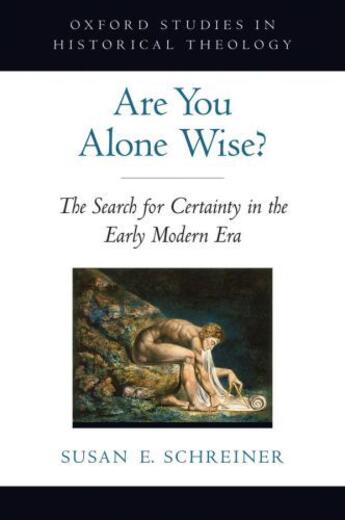Des idées de lecture pour ce début d'année !
Passionné(e) de lecture ? Inscrivez-vous
gratuitement ou connectez-vous pour rejoindre la
communauté et bénéficier de toutes les fonctionnalités du site !

The topic of certitude is much debated today. On one side, commentators such as Charles Krauthammer urge us to achieve "moral clarity." On the other, those like George Will contend that the greatest present threat to civilization is an excess of certitude. To address this uncomfortable debate, Susan Schreiner turns to the intellectuals of early modern Europe, a period when thought was still fluid and had not yet been reified into the form of rationality demanded by the eighteenth and nineteenth centuries.
Schreiner argues that Europe in the sixteenth century was preoccupied with concerns similar to ours; both the desire for certainty -- especially religious certainty -- and warnings against certainty permeated the earlier era. Digging beneath overt theological and philosophical problems, she tackles the underlying fears of the period as she addresses questions of salvation, authority, the rise of skepticism, the outbreak of religious violence, the discernment of spirits, and the ambiguous relationship between appearance and reality.
In her examination of the history of theological polemics and debates (as well as other genres), Schreiner sheds light on the repeated evaluation of certainty and the recurring fear of deception. Among the texts she draws on are Montaigne's Essays, the mystical writings of Teresa of Avila, the works of Reformation fathers William of Occam, Luther, Thomas Muntzer, and Thomas More; and the dramas of Shakespeare. The result is not a book about theology, but rather about the way in which the concern with certitude determined the theology, polemics and literature of an age.
Il n'y a pas encore de discussion sur ce livre
Soyez le premier à en lancer une !

Des idées de lecture pour ce début d'année !

Si certaines sont impressionnantes et effrayantes, d'autres sont drôles et rassurantes !

A gagner : la BD jeunesse adaptée du classique de Mary Shelley !

Caraïbes, 1492. "Ce sont ceux qui ont posé le pied sur ces terres qui ont amené la barbarie, la torture, la cruauté, la destruction des lieux, la mort..."